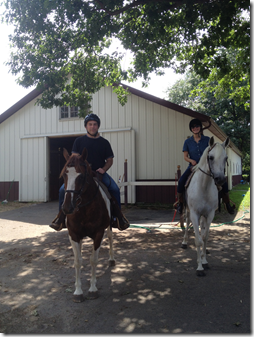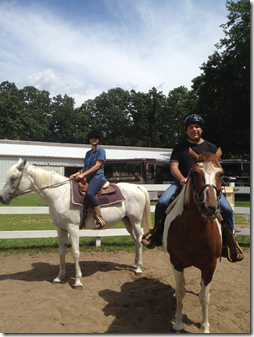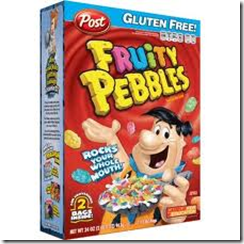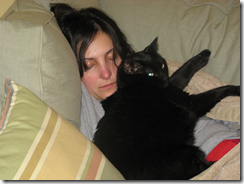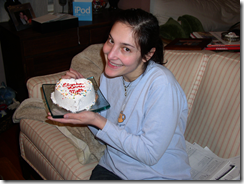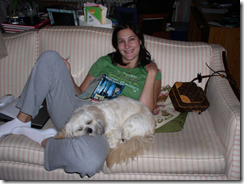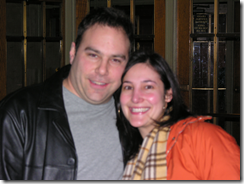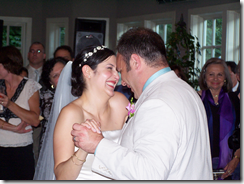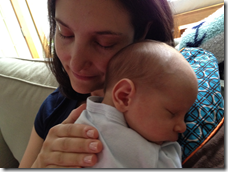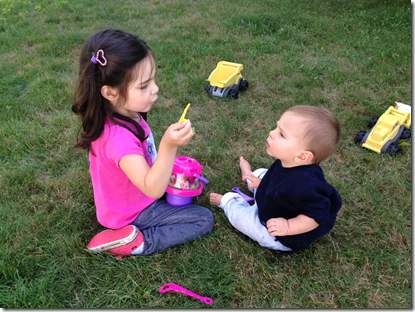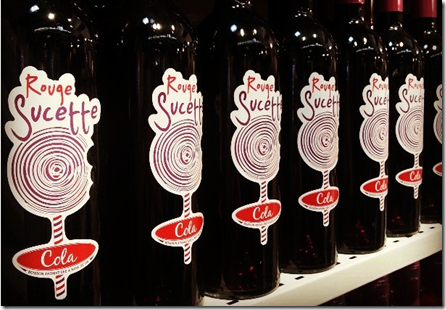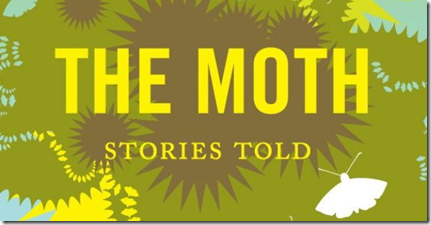Matthew Dicks's Blog, page 457
July 16, 2013
We finished our anniversary in the negative
Yesterday was our seventh wedding anniversary.
I couldn’t imagine a better day.
Best of all, we ended the day in the negative.
My anniversary officially kicked off the night before when I arrived home around 11:00 PM from a wedding and discovered that my lawn had been mowed while I was working at a wedding. I had lamented my bad timing on Facebook earlier that day after noticing that I would probably be spending a portion of my anniversary mowing the lawn, so my friend, Tom (who owns a landscaping business), came over around 9:00 PM and cut it for me.
I have made Tom the villain in the golfing memoir that I;’m in the midst of writing. He’s the villain for good reason, but it’s moments like this that make it difficult for me to be mean to him.
He actually helped to save my marriage immediately following our wedding.
Off the golf course, you won’t meet a better guy.
On the golf course, he is a villain of the greatest order. At least that’s what I want my readers to believe.
On the morning of our anniversary, my wife and I exchanged gifts, although we had nothing to actually hand to each other.
My wife informed me that she was taking me horseback riding for our anniversary. I couldn’t have been more thrilled. I grew up on a horse farm until my parents divorced when I was about nine years old, and so I spent the majority of my early years on the back of a horse.
Since the divorce, however, I had never had a chance to ride again. It’s one of my deepest regrets from my childhood. Climbing on the back of a horse flooded me with memories of my youth. We had a great time riding through the forests and fields behind the farm where she had brought me, and it made me want to start riding again.
I couldn’t imagine a better way to spend the afternoon.
My gift to Elysha was cooking lessons at Sur La Table. I’ve arranged for her to take one class with her mother and another with a close friend later in the month. She was equally excited.
One of my favorite moments from the entire day was when Elysha said, “We both managed to find gifts that didn’t bring any more stuff into our house.”
I loved that.
I recently noted that there are only three types of gift that I want to receive in the future:
The gift of time
The gift of cash
The gift of experience, including learning something new that I can’t currently do
I later added the gift of spiteful yet meaningful charity to the list as well, but this is a gift better suited for a particular breed of human being.
My gifting criteria seeks to eliminate the gift of things in favor of a means of living a more meaningful and full life. I don’t want any more stuff. Instead, I want to be able to do more stuff.
Of course, there are exceptions to this rule.
Elysha gave me a signed first edition of a Kurt Vonnegut novel years ago that I cherish to this day.
Her Christmas-time stocking stuffers are always amazing.
The occasional clothing item, golfing gizmo or new fangled electronic, especially when it is truly needed, is always appreciated.
But as a general rule, I would prefer that items be removed from my home in a gifting situation rather than added to it.
Our gifts to each other, as well as Tom’s gift to me, matched my criteria perfectly.
And the day wasn’t over.
Elysha and I went to dinner that evening and were surprised to learn at the end of the evening that her parents had called the restaurant and picked up the check.
It was a wonderful surprise.
Our final anniversary gift was given to us by our babysitter and friend, Allison, who refused payment (after much protestation on our part) for her babysitting duties.
It was an ideal anniversary. I spent it in the company of my beautiful wife, and at the end of the day, we had added nothing to our home in terms of stuff.
Actually, the garbage and recycling were picked up yesterday. We actually subtracted a considerable amount from the home yesterday.
We ended the day in the red. I couldn’t be happier.
What happened to Fruity Pebbles?
Comedian and podcaster Marc Maron recently described his tendency to drown his sorrows in a bowl of cereal.
He then went on to describe his bowl of cereal as Puffins, some almond milk and a little stevia.
Is this really what the world has become?
July 15, 2013
99 reasons that I love Elysha Dicks
Today is our seventh anniversary. Please forgive me this indulgence.
Here are just some of the many reasons that I love my wife as much as I do.
_______________________________________
1. The way she sleeps on folded hands
2. She once yelled at a 90 year-old woman who was cheating in Scrabble
3. The way she is like a mother and a sister at the same time to Clara
4. She once skipped school to play The Legend of Zelda
5. Many of my friends consider her to be the ideal wife
6. She is one of the finest teachers I have ever known
7. She asked to stop talking to watch The Simpsons on our first date
8. She makes me a better storyteller
9. She loves Led Zeppelin, The Beatles, Paul Simon and Patsy Cline
10. She feels bad about the spiders she kills
11. She tells me what to put me on my plate in a buffet line
12. She asks me when Hard Knocks is starting again
13. She can navigate any mall flawlessly but almost nothing else
14. The way she disappears for two days when she reads a book
15. Her senseless fear of aliens
16. Holding her hand
17. Listening to an audiobook with her on a long drive
18. The new set of parents that she has brought into my life
19. She looks beautiful in a baseball cap
20. She way she puts her hand on my shoulder after a nightmare
21. She knows me better than I know myself
22. The way she plays with infants in her lap
23. The way she runs her hands through my hair while I’m driving
24. Her aggressive response to people who cut in line
25. The way that my friends have become her friends
26. Her infinitesimal lisp
27. The way she reads her childhood stories to our children
28. Her undercover streak of unrelenting nonconformity
29. Watching her dance
30. The way I knew she was pregnant with Clara before she did
31. Her complete and total lack of jealousy
32. The way she has never told me what to wear
33. The degree to which she hates people who hate me
34. Her love for Battlestar Galactica
35. The way she fills our home with music every evening
36. Her ability to react quickly and without panic in an emergency
37. The partnership we share in writing, storytelling and creativity
38. The way she looks in her green Smith tee-shirt
39. Her lack of concern over what others think of her
40. Her inability to watch any scary movie
41. The way she wraps gifts in magazine photographs
42. Her Buffy the Vampire Slayer fandom, including the soundtrack
43. The way she looks while wearing a headband
44. Her astounding patience
45. Her “good rice and chicken” dinner
46. Her fierce love of her grandmother
47. Her ability to name almost any song on the radio within three seconds
48. The way she cried when I asked her to marry me
49. Her harsh but frequently necessary criticism of my writing
50. The way she said Charlie’s name for the first time in the delivery room
51. Her timeless beauty on our wedding day
52. Our “South Park is better than The Simpsons” talk
53. The way she looks in a knit cap
54. The extreme diversity of her friends
55. The way is takes about 15 minutes to become her lifelong friend
56. The fact she has not poisoned our dog or cat yet
57. Her untapped, underutilized and yet remarkable design aesthetic
58. Her camera-ready-but-still-natural-looking smile
59. The way she sneezes multiple times, every time
60. Her willingness to eat ice cream for dinner
61. Any cookie or cake that she has ever baked
62. Watching her dance. I repeat because it is my favorite thing
63. She is in the black in career winnings in poker
64. The way she wept when upon receiving news of my first book deal
65. Her love for a Patriots game on a fall afternoon
66. The way she weeps uncontrollably during year-end school speeches
67. The way everyone seems to love her almost as much as I do
68. Her universal and unfailing support of me
69. The way she has never made me feel guilty about being away from home
70. Those moments in life when she is uncommonly proud of me
71. Falling asleep on my shoulder at the drive-in
72. Her unwarranted confidence in almost everything I do
73. Her love and attachment to yet independence from her parents
74. Her rejection of senseless tradition
75. Her tears on our wedding day
76. The way she stretches in the morning as she wakes up
77. The way she looked on the beaches of Bermuda
78. Her lack of investment in trends and name brands
79. Her embrace and love of Christmas
80. The way her former students still love her years later
81. The way she sings to our children at night
82. The way she barely grips the toothbrush while brushing her teeth
83. The way she speaks to our children the same way she speaks to adults
84. Her unwavering defense of my quirks and eccentricities
85. Her genuinely violent yet laughter-filled response to tickling
86. The way she walks when she is tipsy
87. Her grudging acceptance of my last name
88. The way every wedding I attend makes we want to marry her again
89. Her unparalleled, unjustified acceptance of me in every way
90. The inexplicable pleasure she feels in bathing our children
91. The fact that we have never had an actual fight
92. Her talent for filling stockings with perfect presents at Christmastime
93. The way she dances with our children in the kitchen
94. The affection she feels for her own childhood
95. The way she folds a shirt
96. Her reference to me as a “manly hunk of man meat”
97. The frequency at which she changes her order in a restaurant
98. Her rejection and abhorrence of snobbery in every way
99. Agreeing to marry me on the steps of Grand Central Terminal
July 14, 2013
Now I have to worry about falling cows. Great.
As a person who suffers from an ongoing, intense existential crisis, the last thing I want to hear about is a new way to die.
The world is perilous enough already.
From The Telegraph:
Mr. de Souza’s brother-in-law Carlos Correa told Brazil’s Hoje em Dia newspaper: “Being crushed by a cow in your bed is the last way you expect to leave this earth.
His grieving mother, Maria de Souza, told Brazil’s SuperCanal TV channel: “I didn’t bring my son up to be killed by a falling cow.”
I agree with both of them. There are certain things in life that we should not be worried about. Falling cows is one of them.
The fact that I engaged in a few spirited sessions of cow tipping as a youth does not make me feel any better.
Karma can be a killer. And it’s patient as hell.
Self-loathing and the cronut
I was vaguely aware that a pastry known as the cronut existed.
This morning I heard the NPR story that described the lines for cronuts in New York City. Apparently people are willing to wait more than three hours on the street for this croissant-like pastry shaped like a donut.
As expected, one of the customers defended the hours she spent waiting by claiming that it was “an experience.”
Consumer experts know better.
Irma Zandl is president of the consumer trends company Zandl Group. “There are parts of the brain that become super active when a fad idea is heard, and people want to pass it on.”
“One of the things that we’ve seen with the advent of all these blogs and social media is that people’s desire to be tapped in and to be perceived to be somebody who is in the know is much greater.”
I can’t begin to imagine the degree of self-loathing and required in order to waste hours of your life standing in line for a $5 pastry so that you can be perceived as someone in the know.
One person interviewed by NPR takes a bite of her cronut after waiting in line for two hours and declares, “Totally worth it.”
But the bite wasn’t what made the two hour investment worth it. Not was it “the experience” of waiting in line.
It was the ability to tell her friends about the bite, the chance to tweet about the bite and the photograph that she will post on Facebook of the bite that made it worth the wait.
It’s not about eating the cronut.
It’s about being a person who has eaten a cronut.
How sad it must be to be that person.
July 13, 2013
The thread of melancholy is unavoidable for this parent
Slate’s John Dickerson writes about his regret to invite his parents’ friends to his wedding for Slate’s wedding issue. This paragraph, which deals with parenthood, was especially poignant for me:
There’s an indefinite point in your tenure as a parent where you start to realize your kids are leaving you. For us, the first hints came at about age 9. As your kids age, you delight in the new bonds that replace the old ones. No longer laughing over Dr. Seuss, you’re now laughing over The Avengers and tomorrow Arrested Development. Or you’re watching them pull the wriggling fish off the hook, which was once your job. The moments are so sweet you can usually avoid the thread of melancholy embedded in each of them: With each molting, you reinforce that the molting is happening faster.
I am never able to “avoid the thread of melancholy embedded in each of them.” While I am not a parent who feels that my children are growing up too fast (perhaps because I mark every day in writing), I am constantly aware of the unending series of losses that parenthood represents.
When my four year-old daughter asks me to pick her up and carry her, I do so every time, regardless of circumstance, because I know the number of times I will be able to pick her up are dwindling.
That melancholy shades everything I do with my children. It reminds me of the importance of each moment, but it also reminds me of its impermanence. A nearly lifelong, omnipresent existential crisis has been both a blessing and a curse.
Later this month, I will be telling the story of one of my near-death experiences onstage. While preparing for that story, I wrote this:
There is not a day, not an hour, that goes by that I do not think about my own mortality. I live in a constant, persistent, unending existential crisis. Its causes are two near-death experiences and a robbery that convinced me that I was going to die. It has contributed to more than decade of post-traumatic stress disorder, an inability to sleep peacefully and an awareness and fear of death that had caused me to spontaneously weep at times.
I spend my waking hours wondering if this will be the last time I hug my daughter, the final time I witness a sunset or the last time I hear The Beatles sing about Desmond and Molly and their home sweet home. I go to bed every night, angry about my need for wasteful, unproductive sleep, wondering if I can shave another minute or two off the scant few hours I already spend in bed.
I look at the world and I see impermanence and decay. I see a planetary population that will cease to exist one hundred years from now.
Dickerson is right in describing these parental moments as sweet. Indescribably sweet. Some of the simplest and best moments of my life.
I would like to say that these are unforgettable moments, but I tend to avoid that word because I know that someday I will die and everything will be forgotten.
The ability to avoid the thread of melancholy that is embedded within these moment of parental bliss is something that I cannot do.
I am envious of John Dickerson and every other parent who can.
Girl Learns to Dance in a Year
It’s amazing what you can accomplish in a year if you are willing to apply yourself.
July 12, 2013
First Twinkies return to the shelves. Now this.
Cola-flavored wine. It’s a thing.
At last. I may have found my wine of choice.
Tasty (I hope). Utterly unpretentious. Potentially annoying to wine connoisseurs. A perfect combination of goodness.
Upcoming speaking engagements
I’ve had a few readers (mostly in New York) ask about events where I’ll be speaking next, so I thought I’d share a list here. This is my speaking schedule for the next three months, barring any unforeseen additions to the calendar.
In all likelihood, additional Moth events will be added in the coming weeks.
It’s important to note that there is no guarantee that will be telling a story at any of the StorySLAMs listed below. While I’ve been fortunate enough to have my name drawn most of the time, there are events when I am unable to take the stage.
July 18: Moth StorySLAM
Housing Works, NYC 7:00 PM
July 23: Story Collider
Union Hall, Brooklyn 8:00 PM
August 13: Moth StorySLAM
Housing Works, NYC 7:00 PM
August 15: TEDx Talk: Design the Future
IBM Conference Center, Southbury, CT 8:00 AM-3:00 PM
August 21: How I Learned
Happy Ending Lounge, NYC
August 23: Moth StorySLAM
Housing Works, NYC 7:00 PM
September 13: The Mouth
The Mark Twain House, Hartford, CT 7:30 PM
September 28: Speak Up
Real Art Ways, Hartford, CT, 7:00 PM
October 5: Author talk
Blackstone Public Library, Blackstone, MA 2:00 PM
July 11, 2013
My wife played an enormous role in my recent Moth StorySLAM victory. Here’s how.
On Tuesday night I told a story at a Moth StorySLAM at Housing Works in New York City and was fortunate enough to win.
On Facebook and Twitter, I expressed gratitude to my wife for the role she played in helping me to craft the story. A lot of people responded with questions like “How does that work?” and “What did she do to help?” and “Did you perform for her in the living room?”
They were genuinely curious about how we collaborate on projects like this, so I thought I’d explain a little bit about how Elysha and I work.
Let me begin by saying that I am fortunate to have someone as involved in my creative life as my wife. My friend, Kim, has always said that the most important decision you will ever make in life is your choice of spouse.
She couldn’t be more correct. Not only is Elysha willing to be involved, but she is skilled and intelligent in her approach to creativity, too. So much of my success is the result of her influence on my work.
I have won a total of 5 Moth StorySLAMs during my two years of storytelling, and Elysha has been involved in 4 of those victories (and many, many second place finishes). In one instance, she actually convinced me to change the story I was planning to tell about five hours before the show. I thought she was crazy, but she was adamant. After some moments of indecision, I took her advice and prepared an entirely different story during my lunch break.
And I won. It was probably the best story I’ve ever told.
I’ve learned to listen to m wide whenever possible.
The theme of Tuesday’s StorySLAM was Summer. My story was about a doomed romance during the summer of 1993.
I didn’t perform the story for Elysha in the truest sense of the word because I don’t memorize my stories. They are always true stories from my own life, so I don’t worry about getting lost or mixed-up during my performance. I actually did these things, so I should damn well remember what happened.
I also like the organic nature of storytelling that comes from a story that is not memorized or overly prepared. It allows me to make adjustments on stage, pushing or pulling back on certain aspects of the story based up audience reaction. If the humor isn’t playing well, I can shift to the heart. If the audience thinks I’m hilarious, I can take some risks and push the humor even more.
In at least two instances, I found entirely different and much better endings to my stories in the midst of telling them. In one case, I returned to my seat and Elysha asked if I’d been keeping the real ending to the story a secret from her for some reason.
“No,” I said. “I found it while I was up there.”
At another non-Moth performance, I found a way of turning a sad ending into a funny one. The producer of the show, who had vetted my story beforehand and knew it well, was backstage and not really listening to my performance. When the audience erupted into laughter and I turned to leave the stage, she asked, “What happened?”
“I found a better ending,” I told her.
Had I relied on memorization, I don’t think either of these moments of unexpected discovery could’ve happened.
As a result, every time I tell a story, it sounds a little different, so performing for Elysha in the living room would be silly and unproductive.
It would make me feel silly, too.
But even without memorization, I do have some strategies to get me through the story:
I find important transition points in stories and memorize those specific sentences so I have stepping stones to the end.
I find moments of potential humor and try to find the funniest way of delivering those lines.
I memorize my first 2-3 sentences of my story.
I try to memorize my last line of my story, though that last line often changes while onstage.
I don’t write my stories down anymore, and I don’t time them before the performance. Writing them down has become unnecessary. If I simply run through the story in my mind dozens of times and consistently hit those stepping stones, I’m much better prepared than if I had a sheet of paper in front of me.
The Moth’s 5 minute time limit stressed me out when I started telling stories, but after two years, I’ve developed an innate sense of what a 5 minute story sounds like, and since I don’t memorize the story, I can always edit the story if needed once I receive the first warning bell.
I do almost all my thinking about my stories in the shower now. It sounds crazy, but it’s where I do my best work. It takes about a week’s worth of showering to finalize my story in my mind, and only then do I tell Elysha the story, usually while I am driving.
It makes me feel less self-conscious than simply staring at her and telling the story at the kitchen table.
But rather than telling her the story, I speak about the story aloud. I start to tell the story, usually getting through the first few lines, but then I stop in order to explain what I’m trying to achieve with a specific line or bit of detail, and I ask her to think about whether or not it’s working. Or she stops me to ask a question or comment on something. I think through my story as I tell it to her, including her on the internal debates I’ve been having over how to deliver a line, how to transition through time or space, and what to add or remove. I rarely tell her the story straight through.
Instead, I tell and we talk. Stop-and-go. Simultaneously.
Elysha doesn’t hold back. She doesn’t attempt to be gentle. She doesn’t equivocate. Her comments are often pointed and opinionated. It hurts, but it helps. It’s tough medicine.
All of the work we did for Tuesday’s story was done in the car during our 3 hour drive to the city. Until we climbed into the car, she had almost no idea about the story I planned to tell.
Elysha eliminated two sections of detail in the beginning of the story that were unnecessary and slowed things down. I was overly attached to one section because it represented a bit of personal suffering, but it wasn’t needed. A woe-is-me moment.
I thought the other section was funny. She disagreed.
Ironically, Elysha almost never laughs at any of my stories while we are working on them. Based upon her initial reactions, none of my stories are amusing in any way. She may say that something is funny, but the actual laugh does not come until I am performing onstage.
This can be disconcerting, but I’ve learned to accept it.
She also identified two key lines in the story and transformed them into stepping stones for me. One line summarized my thoughts on an issue succinctly, and she thought the other was both insightful and funny. She thought both lines were important and should not be dropped, so I committed them to memory.
She also found the all-important last sentence of the story, which I had been struggling with all week. Much of storytelling is decision-making. What to tell and what to leave out?
In this case, the question as where to end my story.
Do I end my story here, or do I tell my audience about what happened during the following week as well? Or the following month?
I ran through the ending several times with her, trying a variety of approaches, and when finally I hit upon the right line, she knew it immediately. “That’s it,” she said. “That’s the last line. Stop there.”
She was right.
She also identified areas where I could emphasize the theme of the night better. In truth, she tried to convince me to change my story completely. Since I spent most of my childhood summers at Boy Scout camp, she didn’t understand why I hadn’t chosen any of the dozens of stories I have from my years at Yawgoog Scout Reservation. I went so far as to tell her one of my camp stories in the car and nearly switched to it before deciding to stick to my guns and tell the story that I had prepared.
In this case, I was right and she was wrong. This almost never happens.
These minor changes made an enormous difference in my story. They allowed me to maintain momentum onstage. They kept the story focused on only those elements that were important to the narrative. They eliminated unfunny bits that would’ve fallen flat. They kept the story under the 5 minute time limit without the need for any onstage editing.
Most important, she helped me end my story at just the right moment.
That, in considerably less than a nutshell, is how we work.
Had Elysha been here when I wrote this post, I’m sure she could’ve made it better, too.

